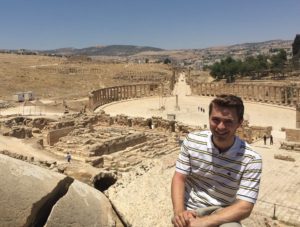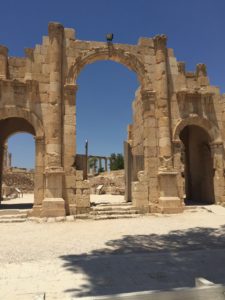And week two is now tarikh!
My first round of quizzes and tests were very difficult, but I am adapting to the study very well. My instructors are a bit on the harsh end for grading, but they truly are striving to improve my Arabic skills.

I am also adapting nicely to the culture here in Jordan! One thing that could be most striking for a westerner is the complete absence of toilet paper outside of one’s apartment. It is consider unclean for Muslims to wipe themselves (for real). Instead, you find bidets – quite literally mini hoses – everywhere. It took me a bit of time to warm up to the bidet, but it really does a good job of cleaning up. One Jordanian teenager even told me to return to the US with one and proclaim that I have brought “new technology” – although I think that might be too far.
While some cultural attributes such as the bidet can be observed without language skills, I realized that I needed to improve my spoken Arabic – or ammiya– if I wanted to engage with locals. I decided to enroll in a supplementary amiyya class at my institute, adding another 5 hours of classes to my week. Despite the time commitment, I am quickly picking up the structures (or lack there of) of amiyya, meaning I can finally interact with people.
Now with some skills, I am starting to converse more with locals then ever before. I was able to meet with a man name Mohammed to watch the England-Colombia football match (and no its not soccer!). My friends and I were surprised when we met him, as he was in his thirties. He was looking for a speaking partner to practice a little English, and we learned he was my kind of guy – AKA an accountant – working in audit for BDO in Amman. We conversed a bit about his career, a bit about our education, and a bit about the match (which to be honest was total crap). We hope that we can keep meeting with Mohammed to practice a bit more.
I was challenged further to interact with locals in my media class. In our class, we were discussing tribes (or ‘ashiraعشيرة) in Jordan and their relationship with the government. Our professor challenged us to talk to three Jordanians and ask them what their ethnicity is, what tribe or family they are from, and what their profession is. I was a bit overwhelmed, as I thought I knew no Jordanians. However, I realized that I was wrong.
I began talking to Mohammed – a safe bet given we had just met to watch a game. We engaged in a meaningful discussion talking about whether tribes added to detracted from Jordanian society. I then talked with Abu Alas, the wonderfully joyful security guard at the institute. Finally, I engaged in my first discussion with Amal – the owner of that mokhobzwe always go to. Through my interviewing I was struck by the different backgrounds each person had; one was a Palestinian, one was Jordanian, and one was Iraqi. These basic conversations (finally in Arabic!) had proved that Jordan is a diverse country. Just fifteen years ago, Amman was a dusty town of a million residents. Thanks to immigration, it is now a booming metropolis of 4 million people. This is fueled to the different immigrants that have come to area from Palestine, Lebanon, Syria, Iraq, Egypt, and other countries. My first engagements with locals were certainly fruitful ones.


I interrupted my intense interactions to have a little fun. My friends and I visited the Roman ruins at Jerash – roughly 45 minutes outside of Amman. Although UNESCO considers the site to be “over-restored” and not a heritage site, seeing the remnants of the Roman world was truly breathtaking. With two Roman temples, twenty churches, three entry arches (all in a row too), the remains of countless houses, a full hippodrome, two amphitheaters, and a full plaza and columnated avenue, it is hard not to be in awe of the Roman civilization. The Middle East has been important for millennia, and it is breathtaking to remind yourself that even the grand Romans found a great deal of importance in what is now tiny Jordan.
The next day, I got back to my talking habits. I was lucky enough to have the opportunity to volunteer with a Jordanian charity called Tikiya um Ali(تكية ام علي), an organization that arranges and delivers boxes of food called hadaya(هدايا) or gifts for individuals living under the poverty line. I joined about six members of my institute along with another twenty or so Jordanian teenagers and college students to help tackle hunger in Amman.
Starting at the warehouse I met a number of people, including a teenager of Jordanian descent with relatives in Amman named Faud who lives in Canton, Michigan – the hometown of my roommate from last year! I also met a Jordanian named Abdulrahman and his 14-year-old cousin – both made sure I learned some of Arabic’s more colorful words. Everyone spoke very good English, so I could not really get much practice in Arabic, but I did have some good experiences to talk about Jordanian day-to-day life and some of the reasons that Jordan is easily the “nicest” or perhaps “most accessible and free” country to live in the Middle East.
While on the bus, Abdulrahman’s cousin asked me a ton of questions – all in English (he was looking for practice, but he was sounding really good). He asked me about America, and even told me he had relatives in Milwaukee, so he had taken a trip to the States. Then, he asked me a very basic question that really got me thinking: “Do you like Trump?”
I gave the young man my response and asked him if he liked Trump. He gave me a pretty deep answer for someone living 6000 miles away from America. He said, “We [Jordanians] don’t like Trump because he doesn’t let certain people in.” I was curious and probed further, asking him if he liked America. He responded, “We love America; we just don’t like Trump.”
Jordan is pivotal role in American foreign policy in the Middle East. The policy for the last thirty years or so centers on the State of Israel being our primary ally, with Israel coordinating with Jordan – a buffer state and secondary ally – to maintain American interests. And because of this, American opinions are generally very positive in Jordan. King Abdullah himself studied at an inferior Catholic school named Georgetown, and he espouses a number of liberal values similar to those of the west. In fact, many Jordanians either have friends or family in the States, and some even studying or travelling frequently to the US. Even American culture is big in the wealthier parts of Amman. As I sat in a bougie two-floor, twenty-four hour Starbucks in Abdoun (the really nice neighborhood home to high profile embassies such as the American and Saudi ones), a hefty Jordanian in his twenties told me about his recent trip to Las Vegas, telling me in perfect English while taking a hit off his Juul, “Dude, I love Vegas! It’s crazy and so much fun.”
The more I asked around, the more I received similar responses. As I ate a meal at a local Yemeni restaurant near my apartment, the waiter – a middle-aged man – asked me if I liked Trump when I told him I was from America. This time – only in Arabic – I asked him if he liked Trump and America. He mirrored the previous response, saying he loved everything about America “ilaa Trump” (except Trump).
I proceeded to ask my professor – an educated female in her mid-twenties – about how Jordanians view America. Politically, there seems to be a lack of knowledge on American policy or even American involvement in Jordan. My professor said that a number of stereotypes about Americans exist; “Americans are rich” is the at the forefront. That said, many Arabs – both in and outside of Jordan – feel friction as many in America have placed Arabs as “the enemy”, although these feelings are usually strictly in regards to our government. While a political dissent for the United States is sometimes apparent, Jordanians seem to embrace Americans and love the culture from which we come.
Shukran to everyone who is actually reading my longwinded commentary. If you are following week-to-week, I have a surprise up my sleeve for next week’s post so stay tuned!